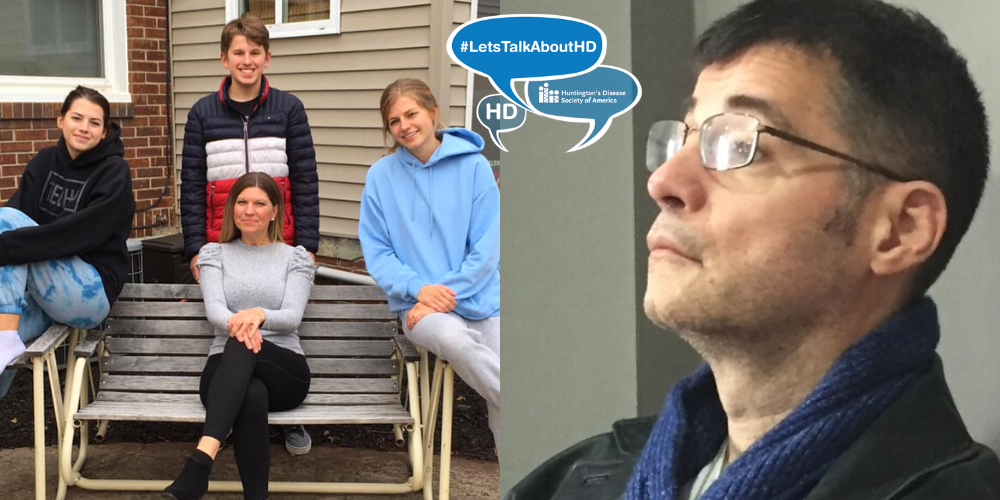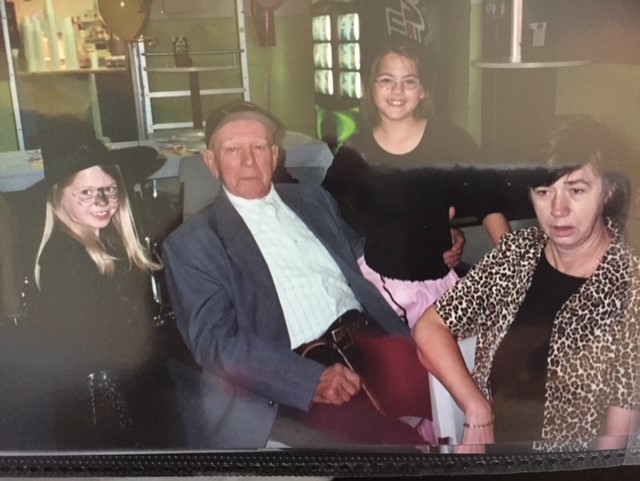
By Matthew Santamaria (msantamaria@hdsa.org)
In 1994, Michigan resident Kristen Pfeifer had her first of two daughters. Kristen would soon learn how Huntington’s disease (HD) would change her life.
HD is a fatal genetic disorder that causes the progressive breakdown of nerve cells in the brain. It deteriorates a person’s physical and mental abilities during their prime working years and has no cure.
HD was not in Kristen’s family bloodline, but her significant other, David, was at risk. Every child of a parent with HD has a 50/50 chance of inheriting the faulty gene.
"His mother started to act differently,” said Kristen. “After his father passed away, David’s mother lived with us as his other relatives were concerned that she had a mental illness.”
His mother was misdiagnosed with bipolar disorder, a mental health condition that causes mood swings at emotional highs and emotional lows.

David’s mother would later test positive for HD. The symptoms of HD are described as having ALS, Parkinson’s and Alzheimer’s – simultaneously. Symptoms include personality changes, mood swings, depression, forgetfulness, impaired judgment, unsteady gait, involuntary movements, slurred speech, difficulty in swallowing, and significant weight loss.
“Her behaviors included clearing her throat, looking like she was choking, wanting to eat all the time but looking very thin, fixated on food, and being unable to make coffee,” Kristen explains. “Her short-term memory was not good. Tasks including making a bed and going from step one to two were now difficult. Her long-term memory was still good and she remembered things from years ago really well but daily tasks became harder and harder.”
David’s mother moved into a care facility in Florida where she was placed on a feeding tube.
"David served in the Army, and everything was going right for him,” said Kristen. “He graduated from the University of Michigan and worked for about ten years. Then, he was unable to hold a job because people thought he was odd or off.”
He would later get tested for HD.
The decision to get genetically tested is difficult to make. Each year, 5-10% are tested. It is never the right or wrong decision to be tested. There are people that see no benefit in knowing that they will develop the disease while others want to know in order to make informed choices about their future. It can take up to several weeks to receive your results from the genetic testing center.
Unfortunately, David tested positive, and Kristen’s daughters were now at risk. At the time, Kristen and David were separated but she always wanted the best for him as she is currently trying to find nursing homes in the local area. To locate resources in your local area, click here
"He lived alone in horrible conditions,” Kristen explains. “I would hire cleaners and my daughters would also check on him. My son, not his biological father, would check on him as well.
His symptoms started to progress. He would get into car accidents and get into bar altercations. There have been documented cases of people with HD having difficult interactions with law enforcement because their symptoms are misidentified, misunderstood, or mishandled. To read more, click here
“I explained to the officers about his condition when they dropped him off at my house after they called me because I am on his phone as his ICE (in case of emergency),” said Kristen. “His good days are when he does some physical exercise. This includes going for a few walks which makes the days go well as they can. My daughters understand the risk of HD and want to be a part of HD trials.”
###
Huntington’s disease (HD) is a fatal genetic disorder that causes the progressive breakdown of nerve cells in the brain. It deteriorates a person’s physical and mental abilities during their prime working years and has no cure. Every child of a parent with HD has a 50/50 chance of inheriting the faulty gene. Today, there are approximately 41,000 symptomatic Americans and more than 200,000 at-risk of inheriting the disease. The symptoms of HD are described as having ALS, Parkinson’s and Alzheimer’s – simultaneously.
The Huntington’s Disease Society of America is the premier nonprofit organization dedicated to improving the lives of everyone affected by HD. From community services and education to advocacy and research, HDSA is the world’s leader in providing help for today and hope for tomorrow for people with HD and their families.
HDSA was founded in 1967 by Marjorie Guthrie, the wife of legendary folk singer Woody Guthrie. Woody died from HD complications when he was only 55 years old, but the Guthrie family legacy lives on at HDSA to this day.
To learn more about Huntington’s disease and the work of the Huntington’s Disease Society of America, visit www.HDSA.org or call 1(800)345-HDSA.
This is a story featuring a personal experience with Huntington’s disease. If you would like to have your story told please contact Matthew Santamaria at msantamaria@hdsa.org
In 1994, Michigan resident Kristen Pfeifer had her first of two daughters. Kristen would soon learn how Huntington’s disease (HD) would change her life.
HD is a fatal genetic disorder that causes the progressive breakdown of nerve cells in the brain. It deteriorates a person’s physical and mental abilities during their prime working years and has no cure.
HD was not in Kristen’s family bloodline, but her significant other, David, was at risk. Every child of a parent with HD has a 50/50 chance of inheriting the faulty gene.
"His mother started to act differently,” said Kristen. “After his father passed away, David’s mother lived with us as his other relatives were concerned that she had a mental illness.”
His mother was misdiagnosed with bipolar disorder, a mental health condition that causes mood swings at emotional highs and emotional lows.

David’s mother would later test positive for HD. The symptoms of HD are described as having ALS, Parkinson’s and Alzheimer’s – simultaneously. Symptoms include personality changes, mood swings, depression, forgetfulness, impaired judgment, unsteady gait, involuntary movements, slurred speech, difficulty in swallowing, and significant weight loss.
“Her behaviors included clearing her throat, looking like she was choking, wanting to eat all the time but looking very thin, fixated on food, and being unable to make coffee,” Kristen explains. “Her short-term memory was not good. Tasks including making a bed and going from step one to two were now difficult. Her long-term memory was still good and she remembered things from years ago really well but daily tasks became harder and harder.”
David’s mother moved into a care facility in Florida where she was placed on a feeding tube.
"David served in the Army, and everything was going right for him,” said Kristen. “He graduated from the University of Michigan and worked for about ten years. Then, he was unable to hold a job because people thought he was odd or off.”
He would later get tested for HD.
The decision to get genetically tested is difficult to make. Each year, 5-10% are tested. It is never the right or wrong decision to be tested. There are people that see no benefit in knowing that they will develop the disease while others want to know in order to make informed choices about their future. It can take up to several weeks to receive your results from the genetic testing center.
Unfortunately, David tested positive, and Kristen’s daughters were now at risk. At the time, Kristen and David were separated but she always wanted the best for him as she is currently trying to find nursing homes in the local area. To locate resources in your local area, click here
"He lived alone in horrible conditions,” Kristen explains. “I would hire cleaners and my daughters would also check on him. My son, not his biological father, would check on him as well.
His symptoms started to progress. He would get into car accidents and get into bar altercations. There have been documented cases of people with HD having difficult interactions with law enforcement because their symptoms are misidentified, misunderstood, or mishandled. To read more, click here
“I explained to the officers about his condition when they dropped him off at my house after they called me because I am on his phone as his ICE (in case of emergency),” said Kristen. “His good days are when he does some physical exercise. This includes going for a few walks which makes the days go well as they can. My daughters understand the risk of HD and want to be a part of HD trials.”
Kristen has a message for the HD Community:
“We need to create awareness and educate people about HD.
There are still many physicians that do not know much or who have never heard of it.
If everyone could tell three people a week, then we could really raise awareness.”
“We need to create awareness and educate people about HD.
There are still many physicians that do not know much or who have never heard of it.
If everyone could tell three people a week, then we could really raise awareness.”
###
Huntington’s disease (HD) is a fatal genetic disorder that causes the progressive breakdown of nerve cells in the brain. It deteriorates a person’s physical and mental abilities during their prime working years and has no cure. Every child of a parent with HD has a 50/50 chance of inheriting the faulty gene. Today, there are approximately 41,000 symptomatic Americans and more than 200,000 at-risk of inheriting the disease. The symptoms of HD are described as having ALS, Parkinson’s and Alzheimer’s – simultaneously.
The Huntington’s Disease Society of America is the premier nonprofit organization dedicated to improving the lives of everyone affected by HD. From community services and education to advocacy and research, HDSA is the world’s leader in providing help for today and hope for tomorrow for people with HD and their families.
HDSA was founded in 1967 by Marjorie Guthrie, the wife of legendary folk singer Woody Guthrie. Woody died from HD complications when he was only 55 years old, but the Guthrie family legacy lives on at HDSA to this day.
To learn more about Huntington’s disease and the work of the Huntington’s Disease Society of America, visit www.HDSA.org or call 1(800)345-HDSA.
This is a story featuring a personal experience with Huntington’s disease. If you would like to have your story told please contact Matthew Santamaria at msantamaria@hdsa.org
